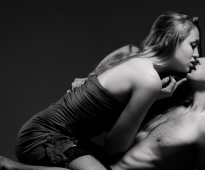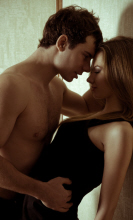|
SePG PAGE
GRAMMAR PAGE HOME |
Writing Erotic Scenes (Grammar)Suggestion #1: Think of your sex scene that way. Not all sex scenes are, but disconnected pieces will work for most.
A strip tease in front of a bunch of guys. Notice how this contains no clauses. Yet everything stands by itself. There is nothing to connect the pieces, yet it makes perfect sense.
The point so far is about content -- think of your sex scene as pieces. Then after you have written out pieces, look at each piece to improve the content. And of course, there are different ways of thinking about sex scenes, but you often want this extreme of just pieces. Next question: What grammar to use? The Odd Grammar of a Sex Scene You can just put the pieces together as one sentence separated by commas. I'm not saying that's always your best choice. But it's one choice, it might sometimes be a good choice, and it's a good place for us to start. (Yes, I will discuss more traditional options in a minute.)
You can just put the pieces together as one sentence separated by commas. I'm not saying that's always your best choice. But it's one choice, it might sometimes be a good choice, and it's a good place for us to start. (Yes, I will discuss more traditional options in a minute.)
That's what Martin Clark does. Actually, his whole book is like that. But the two sex scenes in The Jezebel Remedy are the best sex scenes I have ever read. I usually use ellipses, but this scene of mine starts with commas: Waking up drowsy, lips and kisses on my knee, exciting me, oh my GOD sensations slithering up the inside of my thigh, trying to lay still, I have to squirm, lips and kisses and excitement moving higher . . . lingering, Rob driving me crazy with desire . . . then kisses on my stomach . . . my breasts . . . Rob over my face, Really, you can use anything for your separator; like I said, I like ellipses. They give me a sense of things happening more slowly, and I hope they slow down the reader. Periods work well for a little while, but too many short sentences starts to sound choppy. If you want to do poetry, you can even just use line breaks. A tangle of armsReally, if you want to write your sex scene as pieces, and you are willing to be ungrammatical, your grammatical options are endless. I run my hand up the inside of my thigh, softly caressing it. Gentle. Soft. Heroin to his reptilian brain.When you write this way, your sentences almost certainly turn out to be, not merely ungrammatical, but jarringly ungrammatical. Um, your reader probably won't notice, so I don't know why you would worry about this issue. But there are ways of writing pieces and appearing to be more grammatical. ModernIn the following, there is nothing jarring. It might look like normal grammar, but I think none of the sentences are actually grammatically correct. The author (Joshilyn Jackson, my current favorite) has thought out the pieces of the scene, then expressed them in a nonjarring way which is nonetheless as close as possible to just a sequence of pieces connected by commas.It started as a slight bend toward him that he mirrored, a tentative shift together in the moonlight. Then he rolled on his side, she on hers. They both moved closer, her mouth finding his, his hands fitting themselves to her familiar, long-beloved contours.Depending on genre, you will find this a lot in modern writing. Proper Grammar You can think of your book as presenting information. But that's a really bad way to think of a sex scene, usually. You end up with a flat sex scene that says exactly what you want but bores the reader.
You can think of your book as presenting information. But that's a really bad way to think of a sex scene, usually. You end up with a flat sex scene that says exactly what you want but bores the reader.
But sometimes a sex scene really is ideas. Then normal grammar works fine. The following starts with pieces, then shifts to normal grammar in the next paragraph as the narration changes to commentary (ideas). Be sure to notice the change in grammar. that feels so good too . . . and then my eyes close . . . and I can't stop them from closing . . . and he's still fondling my one nipple, but his other hand is now sliding down my stomach, destination obvious, and Because isn't an image or position or event -- it's an idea. Then she talks about what she knows. Proper grammar works perfect. TraditionalThe following sex scene belongs to Stephen King. (Apologies and thanks if you are reading this, Stephen). He has conceptualized this as a collection of images, positions, events, and feelings. That's perfect. He really is a great writer. Anyway . . .He runs his hands up her smooth sides -- she gives a tiny jump at his initial touch -- and beneath the inside-out shirt. He stretches the fabric and lifts. Her head pops free. She's laughing in little out-of-breath gasps. Her bra is plain white cotton. He holds her by the waist and kisses between her breasts as she unbuckles his belt and pops the button on his slacks.  He starts out with the pieces separated by dashes, then switches to short sentences. He goes as far as he can with that without becoming too choppy, then switches to a longer sentence with the pieces separated by and.
He starts out with the pieces separated by dashes, then switches to short sentences. He goes as far as he can with that without becoming too choppy, then switches to a longer sentence with the pieces separated by and.
And the result is the proper content for a sex scene (pieces) yet a perfectly grammatical passage. With a few problems. The third "piece" (and beneath the inside-out shirt) doesn't make sense by itself. In context, you would already know that her shirt is inside-out, so it would be easier to understand. But it still shouldn't be that hard to understand. Phrases should make sense by themselves or with information from the previous phrase. King's third phrase did not pass that test. Probably not coincidentally, that particular phrase is jolting in King's actual passage. I didn't spend a lot of time on the first piece of advice, on content, but it's important. Think about each piece and how to improve it. I think King could have done better than "kisses between her breast"; I think her shirt would have been better than the shirt.
Also, his adherence to proper grammar pushed him around in subtle ways. A long sentence with a lot of ands is elegaic, to me, and I like to change grammar to indicate a change in mood or content. I am guessing King switched to that long sentence, not to indicate that the mood was changing to more elegaic, but instead just for grammatical variety. Ugh. And I prefer "plain white cotton bra" as a piece -- I can imagine him seeing that. King had "her bra is plain white cotton"; I can't imagine him thinking that. So, finish this up and you will be able to write better sex scenes than King. (If you want to sell more books than King, you're on your own.) Some PhilosophyI think that people can either think rationally or feel, but it's hard for them to do both at the same time. So, the more complicated your grammar is, the more your readers are thinking and the less they are feeling. If you want your readers to simply know the facts of your sex scene, thinking is fine and complicated grammar is fine. If you want them to feel like they are in the sex scene, thinking is not good and complicated grammar is your enemy.Next. Consider these three sentences: 1. He touches her breast, kisses her neck.In a sex scene, you would tend to prefer #1, because it is less grammatical. However, compared to #2 and #3, it is also less precise, which is to say, less informative on how those two events fit together in time. One of the beauties of English grammar is being able to express the relationship between ideas. But. Do you really want precision in your sex scene? There is an order, but things are overlapping. Two things might happen at once, but it isn't that important that they happen together. When something first happens doesn't necessarily correspond to when it's first noticed. So you might want to think of sex as being this somewhat chaotic collection of images, actions, feelings, etc. Up close an impressionistic painting is nonsense; from a distance it makes sense. You might wand kind of the same effect for your sex scene. So you might not want the precision of English grammar; trying to make your sentence grammatical might force you to make choices you don't want to make. Of course you might, for some very good reason, want one of those connecting words (and, then, so, also, etc.). But if you want the swirling array of pieces, you don't need them very often, and you probably don't want to be putting them in just for grammatical reasons. If you choose grammar over pieces, you are forced to make choices, such as and versus then, that you don't want to make. Put another way, you might think of a sex scene as many things happening, and the people are just experiencing them. Then a lack of grammatical connections can be perfect. More?The Plain White Bra, a Hemingway Sex SceneMy "erotic" very short stories This was intended to be the world's most sugar-coated grammar lesson. To learn more about this type of grammar, which I call SPG, you can download my book (or just learn more) here. This style can work well in action scenes, for pretty much the same reasons. Oh, yeah, what I have been calling "completely ungrammatical" is in a way grammatical perfection -- taking the content of a sex scene and using the grammatical structure that best fits that content And, yeah, I decided to try to copy Martin Clark's style, and I discovered I liked writing sex scenes. I mean, they are a fascinating grammatical challenge, but I liked the results too of using that style. |
HOME

